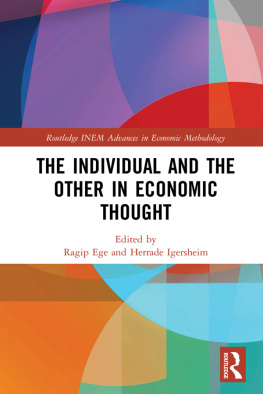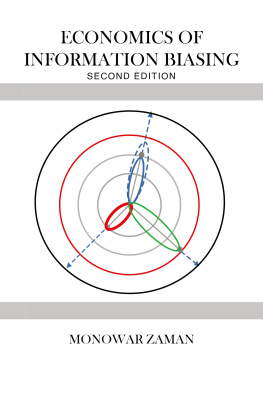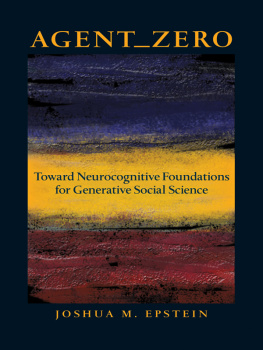The Individual and the Other in Economic Thought
The Philosophy of Economics primarily considers the economic agent as a moral subject. Economics, however, has long overlooked the agents moral that is to say, reasonable dimension, to focus instead on the strictly rational. This volume seeks to address this neglected topic through exploring the Individual and the Other.
The economic agent refers to himself (herself) in terms of his desire and passions, yet also refers to others besides himself. For the rational economic agent, what is the nature of this relationship with the Other? Should it not be understood as undergoing a transformation once we come to consider the economic agent as a reasonable being? Through what process does the Other pass from being an instrument at the disposal of a rational agent to being an end in itself for a moral subject? In other words, how does another become an Other? These questions are behind the re-examination of certain fundamental notions which takes place in this book, an examination which involves a re-reading of certain great authors. With contributions from authors around the world, this work is divided into three main parts. The first deals with individuals from the history of economic thought such as Adam Smith, Karl Marx and Hannah Arendt; this is then followed by a thematic section in which the concepts of recognition and subjectivity are questioned in a market context. Finally, the third part offers an analysis of the issue of the Individual and the Other in different fields of the recent economic analysis including game theory, decision theory or social choice.
The Individual and the Other in Economic Thought aims to help the reader better understand how the relationship between the Individual and the Other has been conceived, conceptualized and framed in economic analysis. It will be of great use to graduate students, scholars and any reader interested in this crucial issue.
Ragip Ege is Emeritus Professor in Economics at the University of Strasbourg, France, and a member of the Bureau dEconomie Thorique et Applique (BETA). His recent research activities focus on the problems of ethics and justice and he is particularly interested in Hegelian political and economic thought.
Herrade Igersheim is a CNRS Research Associate Professor at the University of Strasbourg, France, and Deputy Director of the Bureau dEconomie Thorique et Applique (BETA). Her research focuses on economics and philosophy, welfare economics and experimental economics devoted to voting methods.
Adam Smiths work revolves around the contradiction between the assumption of an impartial spectator and self-interest as the primary motivation for human action. The Individual and the Other in Economic Thought examines the tension between moral and rational agency, by considering the historical development of economic theory and its ethical background and implications.
Vangelis Chiotis, Anglia Ruskin University, UK
Routledge INEM Advances in Economic Methodology
Series Edited by Esther-Mirjam Sent, the University of Nijmegen, the Netherlands.
The field of economic methodology has expanded rapidly during the last few decades. This expansion has occurred in part because of changes within the discipline of economics, in part because of changes in the prevailing philosophical conception of scientific knowledge, and also because of various transformations within the wider society. Research in economic methodology now reflects not only developments in contemporary economic theory, the history of economic thought, and the philosophy of science; but it also reflects developments in science studies, historical epistemology, and social theorizing more generally. The field of economic methodology still includes the search for rules for the proper conduct of economic science, but it also covers a vast array of other subjects and accommodates a variety of different approaches to those subjects.
The objective of this series is to provide a forum for the publication of significant works in the growing field of economic methodology. Since the series defines methodology quite broadly, it will publish books on a wide range of different methodological subjects. The series is also open to a variety of different types of works: original research monographs, edited collections, as well as republication of significant earlier contributions to the methodological literature. The International Network for Economic Methodology (INEM) is proud to sponsor this important series of contributions to the methodological literature.
Philosophy of Mathematics and Economics
Image, Context and Perspective
Thomas A. Boylan and Paschal F. OGorman
The Individual and the Other in Economic Thought
Edited by Ragip Ege and Herrade Igersheim
Economics and Performativity
Exploring Limits, Theories and Cases
Nicolas Brisset
For a list of titles please visit: www.routledge.com/Routledge-INEM-Advances-in-Economic-Methodology/book-series/SE0630
The Individual and the Other in Economic Thought
Edited by Ragip Ege and Herrade Igersheim

First published 2019
by Routledge
2 Park Square, Milton Park, Abingdon, Oxon OX14 4RN
and by Routledge
711 Third Avenue, New York, NY 10017
Routledge is an imprint of the Taylor & Francis Group, an informa business
2019 selection and editorial matter, Ragip Ege and Herrade Igersheim; individual chapters, the contributors
The right of Ragip Ege and Herrade Igersheim to be identified as the authors of the editorial material, and of the authors for their individual chapters, has been asserted in accordance with sections 77 and 78 of the Copyright, Designs and Patents Act 1988.
All rights reserved. No part of this book may be reprinted or reproduced or utilised in any form or by any electronic, mechanical, or other means, now known or hereafter invented, including photocopying and recording, or in any information storage or retrieval system, without permission in writing from the publishers.
Trademark notice: Product or corporate names may be trademarks or registered trademarks, and are used only for identification and explanation without intent to infringe.
British Library Cataloguing-in-Publication Data
A catalogue record for this book is available from the British Library
Library of Congress Cataloging-in-Publication Data
Names: Ege, Ragip, editor. | Igersheim, Herrade, editor.
Title: The individual and the other in economic thought : an introduction / edited by Ragip Ege and Herrade Igersheim.
Description: Abingdon, Oxon ; New York, NY : Routledge, 2018. | Series: Routledge INEM advances in economic methodology | Includes bibliographical references and index.
Identifiers: LCCN 2018009648 (print) | LCCN 2018011359 (ebook) | ISBN 9781315113258 (Ebook) | ISBN 9781138080706 (hardback : alk. paper)
Subjects: LCSH: EconomicsPhilosophy.
Classification: LCC HB72 (ebook) | LCC HB72 .I525 2018 (print) | DDC 330.01dc23
LC record available at https://lccn.loc.gov/2018009648
ISBN: 978-1-138-08070-6 (hbk)
ISBN: 978-1-315-11325-8 (ebk)
Typeset in Times New Roman
by Apex CoVantage, LLC
Contents
RAGIP EGE AND HERRADE IGERSHEIM
Part I
Textual part: the Individual and the Other in the history of thought
DANIEL DIATKINE AND BENOT WALRAEVENS








